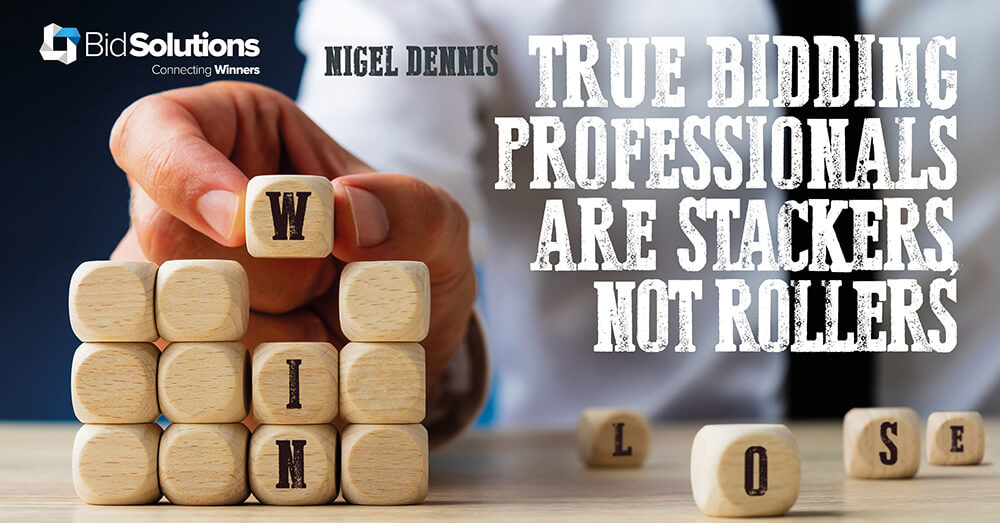
Crafting the ultimate submission
In my bidding career I’ve seen a growing pattern emerge. We bidding perfectionists always start a new bid with the objective of crafting ‘the ultimate submission’. At the outset there’s a palpable sense of excitement as bidding teams make plans and gear up for the task ahead. We are naturally optimistic.
But often, somewhere along the way, best laid plans go awry. In such cases there’s a subtle shift from an aspirational objective of ‘getting it done brilliantly’ to a more pragmatic one of simply ‘getting it done’. Sometimes, when things get ugly, bid efforts are painful. It is not surprising those bids often don’t win. Yet we keep fronting up time and time again. Does that also make us masochistic?
A colleague recently described this process in a far more articulate manner, suggesting that all bidding projects start out in a climate of perpetual sunshine. But then the rain comes, and we seek shelter while we plan a different path to our goal. I thought it a beautiful observation of the reality of our role.
Are we focused on the right stuff?
This mid-bid recalibration seems such common practice that I wonder whether our current perspectives on best practice are correctly focused. Don’t get me wrong, I wholeheartedly endorse concepts like client centricity, the importance of structure, answering the question, ensuring compliance and providing evidence.
But the bulk of these techniques are focused on the things we bidding professionals have most control over – process. The conundrum is that our application of these best practice processes is perfect world stuff and is therefore, arguably, only half of the bidding equation.
As bidding professionals, we know what else matters: how to prioritise a slim bid budget, how to secure timely SME inputs and how to convince key stakeholders their engagement level matters. These are the most common challenges I hear being voiced around our BidWrite consulting offices. Interestingly, they are all behavioural elements. As such, they are not all black and white.
Overcoming the behavioural challenges
All bidding activity occurs within a professional and social context where behavioural elements abound. Levers are being pulled, corners are being fought and personalities are at play. Such is the life of the bidding professional. It is our ability to successfully navigate these challenges, and still meet the submission deadline, that makes us such a valuable contribution to work-winning endeavours.
Perhaps it’s time we place more emphasis on the behavioural elements of bidding than we currently do. This would mirror developments in previously theoretically-driven disciplines like Economics and Finance, which have adopted a more behaviour-centric view of their respective knowledge bases. They understand there’s a place for things that work on the whiteboard, but it’s how that plays out on the irrational ground of human nature that really makes an impact.
Who’s the judge anyway?
This line of thinking could then lead us to a provocative question about bidding best practices. In the end, does it really matter whether it’s the APMP Body of Knowledge, the Shipley Method, the BidWrite Way, or Any Other Way? It seems to me they are all different methods designed to achieve the same outcome. And there’s nothing wrong with that.
But ultimately, the thing that really matters is what buyers think about the outputs of these practices. These buyers are the ultimate arbiter of our efforts, and you can be sure they won’t be judging us on our methods – good, bad or ugly. They’ll be judging us based on quantitative and qualitative perceptions about how well (all things considered) our submission ‘product’ meets their requirements. In effect, the buyers become our judge, jury and potential executioner.
Striving for the Maximum Possible Product
But let’s go back to where we started and reconsider ‘the ultimate submission’. Ideally, we want the most well-resourced team we can muster to implement our best practice processes flawlessly in perpetual sunshine. Some might call this Fairyland! But what if we somehow manage to pull this off and the bid still doesn’t win?
Perhaps a better definition of perfect is a bid that wins, with the least amount of effort and the greatest profit margin. In reality, we know this approach is also unlikely to succeed most of the time.
So let’s look at it another way, by borrowing the concept of Minimum Viable Product (MVP) popular in the software industry. For our bidding profession I’ve called it Maximum Possible Product (MPP). This represents a pragmatic mindset to deliver the best possible product we can, with what we have available, despite the constraints and behavioural challenges that exist.
Stacking the dice in our favour
I must admit I felt a little uneasy about the phrase ‘rolling the dice’ as it applies to this issue of BQ. In my experience, good bidding professionals don’t leave that much to chance. With an MPP mindset, we are experts at squeezing the most amount of juice out of what we are given to work with. Then when the bidding rains come, what I see are considered decisions about what we can do with what we have. Rather than just roll the dice and hope, our job is to stack the dice in our favour.
It’s a very delicate process that requires constant revisiting during the lifecycle of a bid. It doesn’t always work out but that’s the nature of competition. And it’s the endless pursuit of learning how to stack the dice better that keeps us coming back for more.
By approaching our bids in this manner, we then move from Masochistic Rollers to Optimistic Stackers in pursuit of the ultimate submission. This skill appears effortless for talented bidding professionals, and it’s magical to watch when done well.
This article was written by Nigel Dennis.
Nigel has been called a proposal pioneer in Australia for his work in shaping the professional bidding landscape in the region. He has three decades of proposal consulting experience and has trained thousands of people. Nigel started the APMP Australia New Zealand Chapter, runs Australia’s largest specialist bid consultancy and is a strong advocate for development of the profession.

